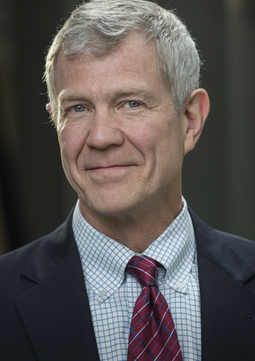Scott
Ramsey
MD
PhD
Education & Training
- MD, University of Iowa College of Medicine, Iowa City, IA (1990)
- Internship and Residency in Internal Medicine, University of Washington, Seattle, WA (1990–1993)
- PhD, University of Pennsylvania Wharton School, Philadelphia, PA (1994)
- Chief Residency in Medicine, University of Washington Medical Center, Seattle, WA (1994–1995)
- Fellowship, General Internal Medicine, Seattle VA Medical Center (1995–1996)
Honors
- Fellow, American College of Physicians (2008)
- American Society for Clinical Investigation (2006)
- Howard Temin Career Development Award, National Cancer Institute (1997)
- Robert Wood Johnson Faculty Support Award (1996)
- Robert H. Williams Award (1995)
- Cecile Lehman Mayer Research Award Recipient (1994)
- General Internal Medicine Fellowship, UW VA (1993–1994)
- John and Oral Sebelin Award, Outstanding Student in Internal Medicine (1990)
- University Research Foundation Support Grant (1989)
- Dean's Scholarship, Wharton School (1987)
- Kellogg Washington Health Policy Fellowship (1986)
- University of Iowa Certificate of Achievement (1983)
clinical interests
- Cancer screening
- Cancer survivorship
research
Dr. Scott Ramsey is a general internist and health economist. He is a Professor in the Cancer Prevention Program, Public Health Sciences Division at the Fred Hutchinson Cancer Center, where he directs the Hutchinson Institute for Cancer Outcomes Research, a multidisciplinary team devoted to clinical and economic evaluations of new and existing cancer prevention, screening, and treatment technologies. In addition, Dr. Ramsey is a Professor in the Schools of Medicine and Pharmacy at the University of Washington.
Trained in medicine and economics, Dr. Ramsey’s research focuses on economic evaluations in cancer. He has published widely on patterns of care, costs, and cost-effectiveness of treatments for lung, colorectal, and prostate cancer. His research portfolio and interests include large-scale SEER-Medicare/Cancer Registry data linkages, patient-reported outcomes, economic modeling of health care interventions, cost-effectiveness analysis, quality-of-life assessment, patterns of care, health care utilization, economic burden of disease for patients and society, pragmatic trial design, early technology assessment, and stakeholder engagement.
Publication highlights
- Roth JA, Etzioni R, Waters TM, Pettinger M, Rossouw JE, Anderson GL, Chlebowski RT, Manson JE, Hlatky M, Johnson KC, Ramsey SD. Economic Return From the Women’s Health Initiative Estrogen Plus Progestin Clinical Trial: A Modeling Study. Ann Intern Med. 2014 May 6;160(9):594-602. PMID: 24798522; PMCID: PMC4157355.
- Ramsey SD, Unger JM, Baker LH, Little RF, Loomba R, Hwang JP, Chugh R, Konerman MA, Arnold K, Menter AR, Thomas E, Michels RM, Jorgensen CW, Burton GV, Bhadkamkar NA, Hershman DL. Prevalence of Hepatitis B Virus, Hepatitis C Virus, and HIV Infection Among Patients With Newly Diagnosed Cancer From Academic and Community Oncology Practices. JAMA Oncol. 2019 Apr 1;5(4):497-505. doi: 10.1001/jamaoncol.2018.6437. Erratum in: JAMA Oncol. 2019 Mar 7;: PMID: 30653226; PMCID: PMC6459217.
- Shankaran V, Li L, Fedorenko C, Sanchez H, Du Y, Khor S, Kreizenbeck K, Ramsey S. Risk of Adverse Financial Events in Patients With Cancer: Evidence From a Novel Linkage Between Cancer Registry and Credit Records. J Clin Oncol. 2022 Mar 10;40(8):884-891. doi: 10.1200/JCO.21.01636. Epub 2022 Jan 7. PMID: 34995125.
- Ramsey SD, Bansal A, Sullivan SD, Lyman GH, Barlow WE, Arnold KB, Watabayashi K, Bell-Brown A, Kreizenbeck K, Le-Lindqwister NA, Dul CL, Brown-Glaberman UA, Behrens RJ, Vogel V, Alluri N, Hershman DL. Effects of a Guideline-Informed Clinical Decision Support System Intervention to Improve Colony-Stimulating Factor Prescribing: A Cluster Randomized Clinical Trial. JAMA Netw Open. 2022 Oct 3;5(10):e2238191. doi: 10.1001/jamanetworkopen.2022.38191. PMID: 36279134; PMCID: PMC9593234.
- Hershman DL, Bansal A, Sullivan SD, Barlow WE, Arnold KB, Watabayashi K, Bell-Brown A, Le-Lindqwister NA, Dul CL, Brown-Glaberman UA, Behrens RJ, Vogel V, Alluri N, Ramsey SD. A Pragmatic Cluster-Randomized Trial of a Standing Order Entry Intervention for Colony-Stimulating Factor Use Among Patients at Intermediate Risk for Febrile Neutropenia. J Clin Oncol. 2023 Jan 20;41(3):590-598. doi: 10.1200/JCO.22.01258. Epub 2022 Oct 13. PMID: 36228177; PMCID: PMC9870230.




